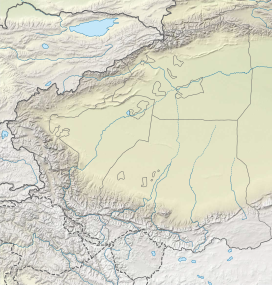Dehra Compass or Dehra Kompas (迪拉村) is the location of a historical caravan campsite in Aksai Chin. It is under Chinese control and claimed by India. Historically, the camp was used by caravans journeying between the Indian subcontinent and Tarim Basin. It was traversed by European explorers during the 1800s.[1] At one point, there were stone shelters constructed at this location to facilitate camping.[2]
| Dehra Compass | |
|---|---|
| Elevation | 5,450 m (17,881 ft) |
| Location | Xinjiang, China |
| Coordinates | 34°55′41″N 78°41′32″E / 34.928192°N 78.69214°E |
 | |
Etymology
edit'Dehra' is derived from the Punjabi and Seraiki language word 'dera', meaning camp, while 'Compass' comes from the name of a survey officer, Kompas Walla.[3]
Sino-Indian border dispute
editIn the events leading to the Sino-Indian War, Indian patrols used Kompas La and Dehra Compass to monitor the area.[2] Chinese troops gained control of this area after May 1961.[4][5][6]
Kompas La
editKompas La or Dehra La (Chinese: 迪拉山口) is the pass through a nearby mountain spur. Historically the pass was to the south reached an elevation of 18,160 feet (5,540 m).[1] Present day, the vehicle accessible gravel road routed to the east, while still one of the highest in the world, only reaches elevation of 5,476 metres (17,966 ft),[7] serving the Chinese border outpost of Heweitan to the west.[citation needed]
See also
editNotes
edit- ^ From map: "THE DELINEATION OF INTERNATIONAL BOUNDARIES ON THIS MAP MUST NOT BE CONSIDERED AUTHORITATIVE"
References
edit- ^ a b John Murray, ed. (1878). "Trotter on the Geographical Results of the Mission to Kashgar in 1873-4". The Journal of the Royal Geographical Society. 48. William Clowes and Sons. Retrieved 1 January 2020.
(p182) and then goes over a spur (Kompás La) 18,160 feet in height and descends into the bed of Kárákásh River (p189) The highest elevation at which our tents were pitched was at Dehra Kompás camp, 17,890 feet above sea-level
- ^ a b Karkra, Bal Krishan (23 October 2019). The Police Warriors on The Indo-Chinese Border in Ladakh. Walnut Publication. pp. 85–86. ISBN 978-81-943486-1-0.
... to look for further evidence of the P.L.A. penetration in the Region. After crossing a mountain pass, Dehra La, Karam reached Dehra Compass (Lat. 34 degrees 56 minutes N, Long. 78 degrees 41 minutes E, Elevation 5450 metres) well before the last light. The place had quite a few stone huts suitable for stay. There were again unmistakable signs of some people having halted there not long ago.
- ^ Bates, Charles Ellison (1878). Central Asia: A contribution towards the better knowledge of the topography, ethnology, resources, & history of Ladak.
- ^ Col Y Udaya Chandar (Retd) (2 January 2018). Independent India's All the Seven Wars. Notion Press. pp. 191–. ISBN 978-1-948473-22-4.
After May 1961 Chinese troops occupied Dehra Compass
- ^ Smith, Chris (1994). India's Ad Hoc Arsenal. Oxford University Press. p. 75. ISBN 978-0-19-829168-8.
- ^ Kavic, Lorne J. (1967). India's Quest for Security: Defence Policies, 1947-1965. University of California Press. p. 169.
Shortly thereafter Chinese troops occupied Dehra Compass
- ^ "Kompas La". dangerousroads.org. Retrieved 1 January 2020.
Kompas La is a high mountain pass at an elevation of 5.476m (17,965ft) ... The road to the summit, also known as Dehra Compass, is gravel, rocky, tippy and bumpy at times.
